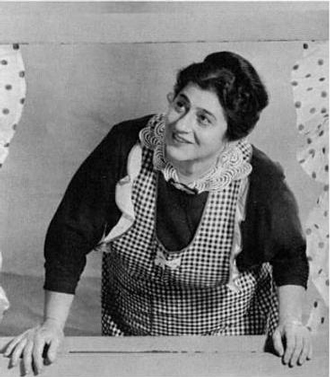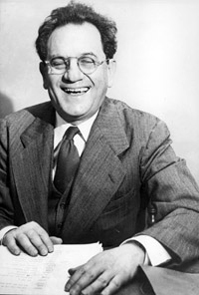
 |
|
|
|
This fascinating documentary took me completely by surprise. Its tagline is 100% true: Gertrude Berg is "The Most Famous Woman in America I Never Heard Of". Back in film school our Television history classes began with Milton Berle and Lucille Ball, skipping over this New York woman who had pioneered the sitcom format twenty years before on the radio, and was established on television years before I Love Lucy. In fact, if it hadn't been for an interruption caused by the infamous Blacklist, I Love Lucy might not have found a place on the TV dial -- it jumped into Gertrude Berg's time slot when the show had to go into hiatus. I became a sentient TV person a couple of years after the show The Goldbergs went off the air in 1955, and so never had much of a chance of seeing the formidable Gertrude Berg in her day. But viewers older than I immediately recognize who she was. As it turns out, Berg seems one of the more influential media personalities of the first half of the 20th century. Yoo Hoo, Mrs. Goldberg uses interviews, photos and abundant film and video resources to tell the story of a remarkable woman. Tired of organizing summer activities and writing plays for the family resort in the Catskills, Gertrude Berg proposed and wrote a 15-minute radio show, The Rise of the Goldbergs, about a lively Jewish family in the Bronx. She only filled in as the warm and supportive matriarch Molly Goldberg for a reading, but soon was both writing the daily show and starring as Molly. The serial ran from 1929 to 1946, and was a popular sentimental favorite. Jews felt uplifted and validated by the show, while other ethnic groups followed it as well. As one of the docu's interviewees attests, other American cultures with tight family structures -- blacks, Greeks -- identified with the show. 
In 1949 Berg turned the show into the groundbreaking TV half-hour The Goldbergs, pioneering the TV sitcom. "People continually popped in the door to revitalize the scene", says interviewee Norman Lear, describing the defining trait of the sitcom. As Molly, Gertrude Berg was as lovable in person as when viewers only knew her voice. She won the very first Emmy for Best Actress in a comedy role. Paramount made a movie version of the show in 1950. Clips show that Hollywood interfered by imposing a waspish romantic couple for Molly to advise, played by Barbara Rush and Peter Hanson of When Worlds Collide. But the real debacle came in 1951 when Red Channels singled out Gertrude's beloved co-star Philip Loeb as a Communist, mainly for his activist work for unions. Berg held out against the blacklist pressure, which caused a one-year interruption in the show. Loeb eventually had to resign anyway. When the show returned it stayed on the air for three more years, finally succumbing in 1955 when the network transplanted the Goldbergs from their native New York to the suburbs. Clips from the final season show the warm family drama robbed of its unique identity and appeal. Loeb, however, fell into a depression and took his own life in a hotel room. Drummed out of his life's work and harassed to death, Loeb is a prime example of the evil of the Blacklist, a working actor who denied any Communist affiliation yet was persecuted because of a controversy created by his persecutors. In the movie The Front, Zero Mostel's character is a tribute to Philip Loeb, dramatized in Mostel's famous hotel room scene. Director Akiva Kempner is a practitioner of biographical documentaries. Gertrude Berg was a natural because there was so much film to be gathered about her, and plenty of interesting figures to interview. We see Berg and her husband guesting on Edward R. Murrow's TV show Person to Person, and Berg also appears on major TV variety shows. Photos show her to be an influential role model, residing in a swank New York apartment: her beginning salary for her first radio show back in the depression years was $2,000 per week. She associated with Eleanor Roosevelt and was lauded by notables of all kinds. The docu gives equal emphasis to her private life, including interviews with the daughter of her personal jack-of-all-functions companion, who was with her for over thirty years. Only briefly do we hear that Gertrude could be domineering and temperamental -- but what actor-writer working under similar pressure is a full-on saint? Ms. Kempner also scores impressive interviews that give depth to Gertude Berg's influence, and offer glimpses of a range of Jewish-American viewpoints. Supreme Court Justice Ruth Bader Ginsburg was a childhood Molly fan, and remembers being called Goldberg instead of Ginsberg at one of her first court sessions. Liberal actor Ed Asner recalls memories of a Jewish childhood in which he wanted to downplay his ethnicity, and therefore avoided the example of the radio and TV Goldbergs. We're told that newly-arrived European refugees, some of them barely escaped from dire circumstances, saw Berg's TV show as proof that America would accept Jews and respect their rights. Other thoughtful contributors include family members and an NPR executive. They examine "Molly Goldberg's" example as a new template for the standard Jewish Mother. Instead of a shy, suffering family workhorse, Molly is outgoing, proactive and an equal partner with her husband when it comes time to make family decisions. The ideal TV chemistry of Gertrude Berg and Philip Loeb makes the blacklisting of that actor especially painful -- it's as if the reactionary Commie hunters wanted to suppress the presence of ethnic minorities in entertainment. 
Yet the overall impact of Yoo Hoo, Mrs. Goldberg is decidedly positive. The smiling face of Gertrude Berg guarantees that point of view, and the arc of her life was remarkable. How could she have been forgotten? New Video / Docurama's DVD of Yoo Hoo, Mrs. Goldberg is a very good encoding of this eye-opening and highly entertaining docu show. Most of the film clips look fine, even when taken from imperfect Kinescope recordings of live broadcasts. In one burst of clips we see a young Steve McQueen and actress Anne Bancroft (very blurry, unfortunately) playing guest roles on the show. The audio quality is just fine, and Kempner's full audio commentary appears on a second track. The show delivers a great deal of information and emotion, and isn't a minute longer than it ought to be. Too many documentaries these days seek 'importance' through excessive length. The extras on a second DVD disc suggest that the producers received plenty of cooperation from TV archives. Three episodes of TV's The Goldbergs are present, along with Gertrude Berg's appearances on the TV shows of Edward R. Murrow and Ed Sullivan. Unused interview material and cut scenes are offered. An insert folder contains a short essay by the director. Philip Loeb's contribution to Jewish heritage is still being celebrated, as can be seen in this Broadway.com notice of a Philip Loeb Tribute Night in New York.
On a scale of Excellent, Good, Fair, and Poor,
Yoo Hoo, Mrs. Goldberg rates:
Reviews on the Savant main site have additional credits information and are often updated and annotated with reader input and graphics. Also, don't forget the 2010 Savant Wish List. T'was Ever Thus.
Review Staff | About DVD Talk | Newsletter Subscribe | Join DVD Talk Forum |
| ||||||||||||||||||